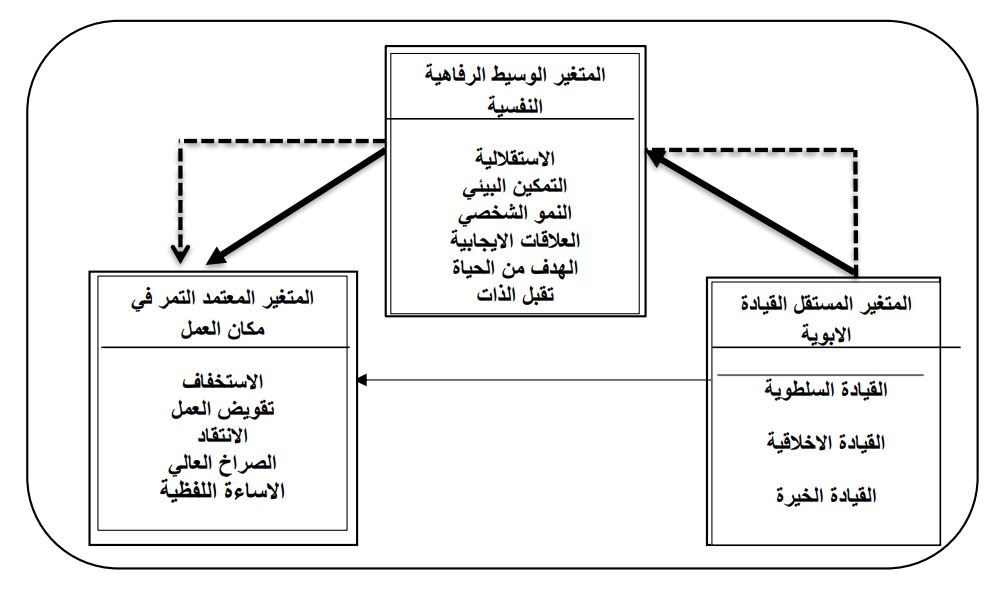القيادة الأبوية ودورها في الحد من التنمر في مكان العمل: الدور الوسيط للرفاهية النفسية (بحث تحليلي لآراء عينة من المدرسين العاملين في مدارس محافظة بابل)
DOI:
https://doi.org/10.71207/ijas.v20i82.2758الكلمات المفتاحية:
القيادة الأبوية، التنمر في مكان العمل، الرفاهية النفسيةالملخص
هدف البحث الى بيان التأثير الذي تمارسه القيادة الأبوية في الحد من التنمر في مكان العمل من خلال الدور الوسيط للرفاهية النفسية على مستوى عينة من المدرسين العاملين في بعض مدارس في محافظة بابل، وقد مُثلت المشكلة بعدة تساؤلات وكان من اهمها (هل تسهم القيادة الأبوية في تقليل او الحد من التنمر في مكان العمل في المدارس المبحوثة) وقد تم استخدام المنهج الوصفي التحليلي باعتباره احد المناهج المستخدمة في البحوث الاجتماعية والإدارية، واستخدمت الاستبانة كأداة رئيسة في جمع البيانات، وكان المجتمع المبحوث يتكون من اربعة مدارس واقعة في محافظة بابل. اما العينة المختارة فقد بلغت (100) من المدرسين العاملين في تلك المدارس، وقد تم استخدام عدد من الوسائل الاحصائية منها: اختبار التوزيع الطبيعي، التحليل العاملي التوكيدي، وتم اعتماد البرامج الإحصائية التالية (SPSS; Amos; Microsoft Excel). وكان من أبرز النتائج التي تم التوصل اليها هو ان القيادة الأبوية تسهم في الحد من التنمر في مكان العمل إضافة الى ان متغير الرفاهية النفسية يتوسط العلاقة بين المتغير المعتمد والمستقل.
التنزيلات
المراجع
خلف، ياسر لطيف وعبد ، عذراء محسن ومحمود ، زيد خوام ، (2020) " القيادة الأبوية ودورها في الانغماس الوظيفي " ، مجلة كلية المعارف الجامعة ، المجلد 31 ، العدد 2 ،334-365 .
غالي ، حيدر حسين ، (2020) " تأثير القيادة الأخلاقية كمتغير تفاعلي في العلاقة بين سلوك العمل المنحرف والأزمات التنظيمية الداخلية " رسالة ماجستير ، كلية الإدارة والاقتصاد ، جامعة الكوفة .
محمد، وسام عبد الأمير،(2023)"الرفاهية النفسية وتأثيرها في الحد من سلوك التنمر في مكان العمل دراسة استطلاعية لعينة من الجامعات والكليات الاهلية في محافظة كربلاء المقدسة" رسالة ماجستير ، كلية الإدارة والاقتصاد ، جامعة كربلاء .
واعر، وسيلة ،(2020)" تأثير القيادة الابوية على أداء الموارد البشرية " مجلة الاستراتيجية والتنمية ، المجلد 10 ، العدد 4 ،30-49.
Arjanto, P., Bafadal, I., Atmoko, A., & Sunandar, A. (2023). https://ejce. cherkasgu. press. European Journal of Contemporary Education, 12(4).
Aybar, S., & Cark, O. (2023). Paternalistic leadership and work engagement in the innovative service industry: the mediating role of psychological contract. Marketing i menedžment innovacij, 14(4), 32-47.
Brotheridge, C. M., & Lee, R. T. (2007). Examining the relationship between the perceived work environment and workplace bullying. Canadian Journal of Community Mental Health, 25(2), 31-44.
Çevik, M. N., & Çevik, M. S. (2023). The Relationship between School Administrators' Paternalistic Leadership Behaviours and Teachers' Work Alienation Levels. European Journal of Educational Management, 6(1), 15-30.
Cheng, B. S., Chou, L. F., Wu, T. Y., Huang, M. P., & Farh, J. L. (2004). Paternalistic leadership and subordinate responses: Establishing a leadership model in Chinese organizations. Asian journal of social psychology, 7(1), 89-117.
Cheng, M. Y., & Wang, L. (2015). The mediating effect of ethical climate on the relationship between paternalistic leadership and team identification: A team-level analysis in the Chinese context. Journal of business ethics, 129(3), 639-654.
Cicellin, M., Mussolino, D., & Viganò, R. (2015). Gender diversity and father–daughter relationships: understanding the role of paternalistic leadership in family firm succession. International Journal of Business Governance and Ethics, 10(1), 97-118.
Dedahanov, A. T., Bozorov, F., & Sung, S. (2019). Paternalistic leadership and innovative behavior: Psychological empowerment as a mediator. Sustainability, 11(6), 1770.
Device, Gamian-Wilk, M .(2016). Personality traits as predictors or outcomes of being exposed to bullying in the workplace. Personality and Individual Differences, 115, 43.
Devonish, D. (2013). Workplace bullying, employee performance and behaviors: The mediating role of psychological well-being. Employee relations, 35(6), 630-647.
Dhanabhakyam, M., & Sarath, M. (2023). Psychological wellbeing: A systematic literature review. International journal of advanced research in science, communication and technology, 3(1), 603-607.
Di Martino, V. (2002). Workplace violence in the health sector. Country case studies Brazil, Bulgaria, Lebanon, Portugal, South Africa, Thailand and an additional Australian study. Ginebra: Organización Internacional del Trabajo, 3-42.
Edwards, M., & Blackwood, K. M. (2017). Artful interventions for workplace bullying: exploring forum theatre. Journal of Workplace Learning, 29(1), 37-48.
Edwards, S. D., Ngcobo, H. S., Edwards, D. J., & Palavar, K. (2005). Exploring the relationship between physical activity, psychological well-being and physical self-perception in different exercise groups. South African Journal for Research in Sport, Physical Education and Recreation, 27(1), 59-74.
Ghayas, M. M., Khan, M. M. S., Singh, E. P., Alajlani, S. E., & Ghafar, A. (2023). PATERNALISTIC LEADERSHIP AND ORGANIZATIONAL COMMITMENT: EVIDENCE FROM THE INFORMATION TECHNOLOGY SECTOR.
Ghosh, K. (2015). Benevolent leadership in not-for-profit organizations: Welfare orientation measures, ethical climate and organizational citizenship behaviour. Leadership & Organization Development Journal, 36(5), 592-611.
Green, C., & Dimino Luong, A. (2023). Bullied: exploring the concepts of territorialism and groupthink involvement in workplace bullying. Nursing open, 10(10), 6777-6781.
Hanhimäki, E. (2023). Moral Professionalism in the Context of Educational Leadership. In Leadership in Educational Contexts in Finland: Theoretical and Empirical Perspectives (pp. 201-216). Cham: Springer International Publishing.
João, A. L., & Portelada, A. (2023). Coping with workplace bullying: Strategies employed by nurses in the healthcare setting. In Nursing Forum (Vol. 2023, No. 1, p. 8447804). Hindawi.
Khuwaja, U., Ahmed, K., Abid, G., & Adeel, A. (2020). Leadership and employee attitudes: The mediating role of perception of organizational politics. Cogent Business & Management, 7(1), 1720066.
Kim, J. A. (2023). Bullying Experiences of Workers in Small-Sized Workplaces: A Phenomenological Study. Sustainability, 15(21), 15436.
LaVan, H., & Martin, W. M. (2008). Bullying in the US workplace: Normative and process-oriented ethical approaches. Journal of business ethics, 83, 147-165.
Malik, A. J., & Santoso, C. B. (2022). The influence of paternalistic leadership on individual performance. Journal of Leadership in Organizations, 4(1).
Malik, N. A., & Björkqvist, K. (2019). Workplace bullying and occupational stress among university teachers: Mediating and moderating factors. Europe's journal of psychology, 15(2), 240.
Mazahreh, A., Hammad, H., & Abu-Jaber, H. (2009). The attitudes of instructors and faculty members about the quality of technical education programs in community colleges in Jordan. Journal of Social Sciences, 5(4), 401-407.
Pompeii, L., Dement, J., Schoenfisch, A., Lavery, A., Souder, M., Smith, C., & Lipscomb, H. (2013). Perpetrator, worker and workplace characteristics associated with patient and visitor perpetrated violence (Type II) on hospital workers: A review of the literature and existing occupational injury data. Journal of Safety Research, 44, 57-64.
Ryff, C. D. (2013). Psychological well-being revisited: Advances in the science and practice of eudaimonia. Psychotherapy and psychosomatics, 83(1), 10-28.
Savitri, M. D. (2024). Keseimbangan Kerja-Kehidupan Berpengaruh Pada Kesejahteraan Psikologis Pekerja. BULLET: Jurnal Multidisiplin Ilmu, 3(3), 420-431.
Strutyńska-Laskus, E., Madeja-Bień, K., & Gamian-Wilk, M. (2023). How the Workplace Influences Teachers’ Creativity: A Two-Wave Study on Workplace Bullying, Organisational Bullying Risk Factors and Creativity. Przegląd Badań Edukacyjnych (Educational Studies Review), 1(41), 139-162.
Ünler, E., & Kılıç, B. (2019). Paternalistic leadership and employee organizational attitudes: the role of positive/negative affectivity. Sage Open, 9(3), 2158244019862665.
Zanabazar, A., Jigjiddorj, S., & Jambal, T. (2023). Impact of Workplace Bullying on Job Burnout. Jurnal Ilmiah Peuradeun, 11(3), 1071-1090.

التنزيلات
منشور
كيفية الاقتباس
إصدار
القسم
الرخصة
الحقوق الفكرية (c) 2024 كلية الادارة والاقتصاد- جامعة كربلاء

هذا العمل مرخص بموجب Creative Commons Attribution-NonCommercial-NoDerivatives 4.0 International License.
يحتفظ المؤلفون بحقوق الطبع والنشر لأوراقهم دون قيود.
















